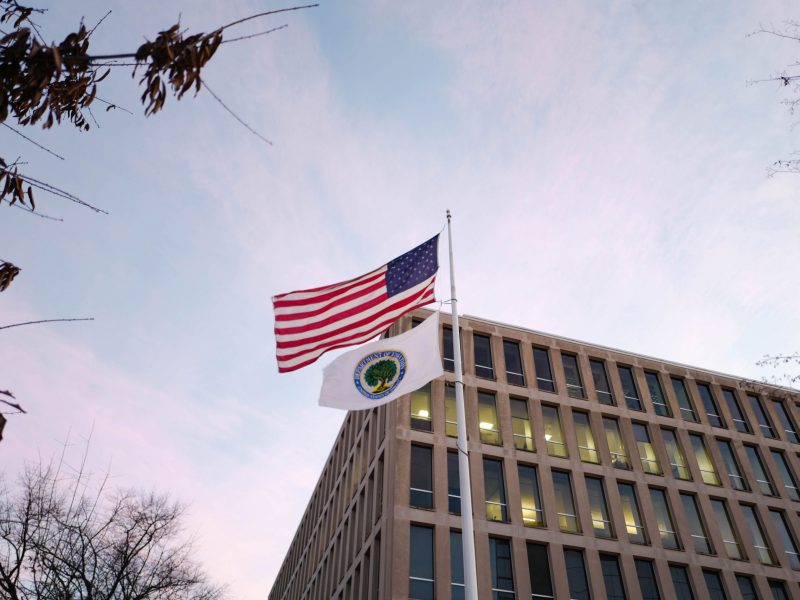Experts say President Donald Trump’s efforts to weaken the U.S. Department of Education would severely impact higher education and students’ ability to afford college.
Trump’s administration has been working to dismantle the department through executive action as part of a larger campaign to cut government spending and the federal workforce. A diminished department could impact student loans, financial aid and research funding.
“The changes and the cuts are going to be a lot more severe and dramatic than what I, and I think many of my colleagues, ever imagined,” University of Maryland associate education policy professor David Blazar told The Diamondback.
The education department primarily supports public education through financial aid programs, research funding and student loans. State and local governments have a more direct role in appropriating operational funds and establishing education policy, according to the department’s website.
Nancy Shapiro, the University System of Maryland’s former associate vice chancellor for education and outreach, said the department also is responsible for ensuring equitable access to education and managing the overall education pipeline from pre-kindergarten to graduate school.
“If we didn’t have the federal role in public education, the public schools would be dependent on local and state support, and not every state is equally rich,” Shapiro said. “What the Department of Education does is try to equalize the funding and provide more support for public schools that need it.”
[UMD community members say proposed USM budget cuts could harm students]
Shapiro said a weakened department could lead to a much larger education equity gap, as the department works to ensure diversity in schools.
The education department awards about 13 million students more than $120 billion combined each year in grants, work-study funds and low-interest loans, according to its website.
The process of awarding federal financial aid and Pell Grants would see significant changes without the department, Shapiro said, as it is currently the programs’ main support.
Blazar said many families already face inefficiencies in the financial aid system and that a weakening of the department might further worsen those problems.
Campbell Scribner, an associate education policy professor at this university, said a weakened department would not eliminate student loans, as they would still be due, but the process for students and families may be more difficult.
“It might be that without eliminating any programs, per se, you just raise the sort of barriers and the number of headaches involved in getting loans or whatever it might be,” Scribner said.
In a statement to The Diamondback, Michele Zampini, the senior director of college affordability for The Institute for College Access and Success, a research and advocacy nonprofit organization, said dismantling the department would be “disastrous” for people with federal student loan debt.
“Even before this proposal was floated, many of these borrowers were struggling to pay back loans and navigate changing policies,” Zampini wrote. “Demolishing the Department would unleash even more chaos and uncertainty — upending people’s lives at a time when they need stability more than ever.”
The federal government also plays a key role in providing research grants to higher education institutions, specifically through agencies such as the Institute for Education Sciences, Scribner said. Losing research money could impact the country’s ability to evaluate the success of various education approaches across states, he added.
[Maryland Democrats push bills, legal action to combat Trump’s executive orders]
The National Institutes of Health on Feb. 7 announced a 15 percent cap on “indirect costs” that research institutions such as this university can charge the federal government, including equipment and personnel. A federal judge temporarily blocked the cap on Feb. 10.
Scribner added that without research grants, or with less funding, professors and researchers would face increased obstacles and limited resources, causing the research program to suffer.
Former President Jimmy Carter established the education department in 1979 with the goal of pulling resources across the country together to strengthen education.
Though dismantling the department would require an act of Congress, it can be weakened through reinterpretations or loosenings of the requirements for federal funding, Scribner said. He added that the Trump administration might also send “Dear Colleague Letters” to K-12 schools, colleges and universities to outline how various departments will interpret certain mandates from Congress.
“It’s very possible that you’ll see the Trump administration use [the letters] very aggressively in the same way that they’ve been using executive orders very aggressively to … change the direction of the department,” Scribner said.
Shapiro said the best way students and educators can take action against the education department changes is to vote in upcoming elections.
“As long as we have the vote, we have power,” Shapiro said. “This is a moment in time when people need to take stock of where they stand on the important elements of our democracy, education being, as far as I’m concerned, the most foundational part.”



